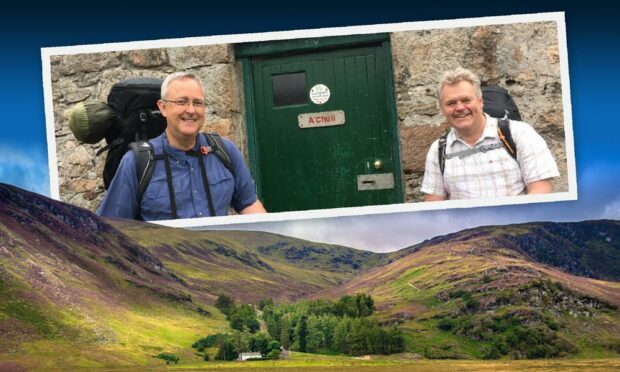A walker who spent two nights lost in the Cairngorms has launched a fundraiser to thank his rescuers.
David Wightman spent an exhausting weekend alone and exposed to the elements after becoming separated from his walking companion, Colin Marshall.
When Mr Marshall managed to raise the alarm, a major search and rescue operation was launched involving Braemar, Cairngorm and Aberdeen mountain rescue teams.
Now the pair have launched a fundraiser to show their “immense gratitude” for the teams.
Speaking to The P&J, Mr Wightman said today: “We decided to do this fundraiser as a thank you for the work that MRTs do, and in particular the three that were involved in the search party over two days to try and find me.
“Ironically, I wasn’t found by the search party but Cairngorm MRT picked me up from the Glenmore campsite at the end of the ordeal after being flown from Glendee to Glenmore via the Inverness Coastguard helicopter.
“There was around 40 people involved from the three rescue teams involved.
“I think the importance of raising money for these rescue teams is to make sure they are there in the unexpected situation that you need them the most.”
The duo had been on a four-day hike in the Cairngorms, which started in Kingussie and was due to finish in Aviemore, when the drama unfolded in the first weekend of October.
‘Experience highlights how unexpected dangers exist’
Mr Wightman, an experienced hillwalker, had been on his way to Corrour Bothy with Mr Marshall when they got separated in low cloud and “howling wind”.
His friend continued on to the bothy, and when Mr Wightman failed to turn up raised the alarm with police, who in turn contacted the mountain rescue teams.
Mr Wightman, from near Southend-on-Sea in Essex, managed to find shelter and was was eventually found by students who shared their food with him before the mountain rescue teams airlifted him to safety – 48 hours after he first became lost.
On their fundraising page, the pair wrote: “The experience highlights how unexpected dangers that exist in such a remote area. Thankfully, after nearly 48 hours, David was located safe but exhausted.
“A couple of errors of judgement led to David and Colin getting separated and finding it impossible to find each other. We were both lost independently.”
‘Wrong turn’ took lost walker away from bothy just a mile away
They continued sharing how the drama unfolded for each of them.
After a few hours of rest at Corrour bothy in Glen Dee, Mr Marshall headed towards Aviemore to raise the alarm, which he managed to do after getting a signal three hours later.
As mountain rescue teams scrambled, Mr Marshall shared their route plan while Mr Wightman’s wife Tracey accessed his Fitbit to try and track him down – confirming he was moving.
Disorientated Mr Wightman, meanwhile, was using a partial printed map and a compass to try and find the bothy but ended up “significantly” off course and spent the night sheltered behind his rucksack.
Their page adds: “At dawn on day three, David was able to see very briefly where he was on his mobile phone OS Map before the phone died. It was impossible to use the charger as it was wet. Consequently, it was possible to work out how to descend to the River Dee valley floor and follow the river.
“The descent was difficult in places and after one head-over-heels fall resulting in a bent walking pole, David slowed the pace. Unfortunately, David couldn’t remember accurately which route the river took at a fork and went left into the wrong valley. If the right fork had been taken, the bothy was just a mile away.”
‘Amazing commitment’ of mountain rescue teams
At about 6pm that night, Mr Wightman saw the rescue helicopter fly over but unfortunately it missed him – meaning he had to spend another night out in the open.
Mr Wightman recalled that fortunately for the time of year, the air temperature was mild and it didn’t rain describing it as “a bit of good luck”.
And his luck held out, as a group of students from Aberdeen University spotted him and ended up leading him back to the bothy, where they fed him and warmed him by the fire until rescuers arrived.
Mr Wightman told the P&J that the commitment from the volunteers who make up mountain rescue teams could not be underestimated, and encouraged people to back the fundraiser.
He added: “I think it is an amazing commitment because not everybody has the capacity to do that kind of work.
“You need to love the countryside and like being out in all weathers. You need to be of a certain disposition to sign-up to work as part of mountain rescue. It is not something just anyone can do.
“The work draws on all types of people but the commonality is the willingness to put themselves at the disposal of people in distress and I think it is a wonderful thing.”
